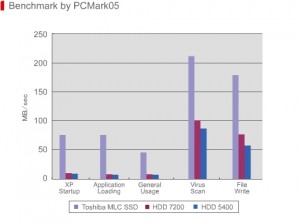I’m not sure which one I’m going to get yet, but base on benchmark performed by various users, it clearly indicated the SDD device out perform even the faster SCSI or SATA storage hard drive. This mean that if I use SSD for my webserver it should be faster than now. The server I have is an i7 16GB RAM 500GB storage not sure if it’s 54000 RPM or 7200RPM, the higher the better, but benchmark doesn’t seems to indicate the different much among those drives. SSD look like the way to go.

The price right now is from $1 a GB to as much as $5 a GB, many users saids Intel is the best, look for random access write at highest speed.
One user back in mid 2010 indicate the following, but it’s been two years, I’m sure other manufactured had improved performance of their drive greatly.
Do:
– pick Intel SSDs; they are great. You would need about 10 OCZ SSDs to match the speed of a single Intel regarding random write
– align them properly and test alignment with AS SSD utility (downloadable via google)
– use a good controller for RAID5; or software RAID for RAID0
– use a Battery Backup Unit (BBU) if you’re going to use RAID5Don’t
– pick SSDs with low random write
– defragment them
– use all available space; since you are running RAID5 you NEED to reserve space on the SSD; i.e. if the SSD is 80GB you should create a 40GB partition and not use the other 40GB.Also be aware that even a single SSD can bottleneck an expensive Areca-class Hardware RAID controller; as these are typically limited to 70.000 IOps. A RAID of Intel SSDs will go beyond that; so consider yourself ‘capped’ to 70k IOps.
Also; alignment with RAID5 is a bit tricky. Assuming 1024K offset (Vista/Win7) you would need an uneven number of disks; so 5 SSDs for example; with 128KiB stripesize that would get you a full stripe block of (5-1) * 128KiB = 512KiB which is fine with 1024K offset. However, if you pick 4 SSDs in RAID5 that would be (4-1) * 128KiB = 384KiB which is not aligned with 1024K – lower performance and less endurance is the result. Generally, RAID5 and SSDs is not an ideal combination.